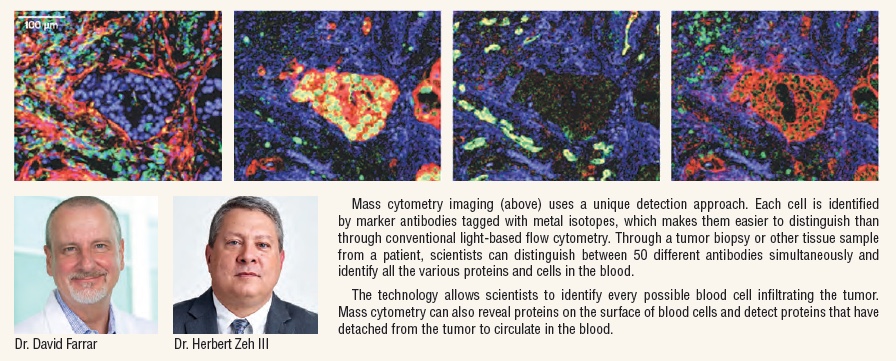Dekelboum Foundation brings power of mass cytometry to UTSW
By Sharon Reynolds
The Elsie & Marvin Dekelboum Family Foundation has made a substantial gift to UT Southwestern to purchase a leading-edge mass cytometry unit (MCU) for researching the properties of complex cellular systems and processes. It combines the abilities of flow cytometry and mass spectrometry into a significantly more advanced and precise imaging tool. The Foundation is passionate about eradicating pancreatic cancer – and the addition of an MCU will accelerate UT Southwestern’s efforts to achieve this goal.
“The mass cytometry unit provides an exciting leap forward in our technological capabilities that will ultimately benefit patients and make innumerable contributions to the global understanding of pancreatic cancer and other diseases,” said Dr. Herbert Zeh III, Chair and Professor of Surgery at UT Southwestern and an innovator and leader in the field of pancreatic cancer.
Because UT Southwestern Pancreatic Cancer Program research outcomes are closely tracked and referenced nationwide, the impact of a new MCU has the potential to benefit all UTSW pancreatic cancer patients as well as patients at other medical centers across the country. The impact, however, goes far beyond pancreatic cancer research. This technology may be used to examine any cells that can be put in a solution or dissected on a slide, so it has applications for studying every type of disease.
This powerful technology empowers biomedical researchers to view cells as never seen before, which means it offers insights into all types of cancer, autoimmune, and infectious diseases, immunology, and immunotherapy research. Mass cytometry is revolutionizing how scientists around the world are analyzing cells and tissue samples, enabling them to study more than 50 markers simultaneously on millions of individual cells. Scientists can identify new cell types, functions, and biomarkers; this represents a quantum advance over the current standard methods of cell analysis.

“We are the only facility in North Texas that has adopted this technology,” said Dr. David Farrar, Associate Professor of Immunology and Director of the UT Southwestern Flow Cytometry Facility. “The mass cytometry unit’s technology is incredibly powerful and uses a completely new cell detection approach, allowing scientists to address complex questions about how different cells look, how they affect each other, and how they function.”
Mass cytometry is emerging as a critical research and clinical tool. “It takes philanthropic donors with a heart to understand that technology really is the driver for discovery that will take us to the next level,” Dr. Farrar said.
The power of mass cytometry – a variation of flow cytometry in which antibodies are labeled with heavy metal ion tags rather than fluorochromes – provides an unprecedented view of tissues and tumors. The technique allows researchers to answer difficult questions about the nature of the human immune system, informing development of precision medicine approaches to therapies. The technology has the potential to change how diseases such as pancreatic cancer are treated and ultimately cured.
"The Dekelbaum Foundation has provided an opportunity for our faculty to identify new biomarkers to inform diagnostic and therapeutic decisions, accelerate the development of more effective therapies, and advance clinical trials at UT Southwestern. Mass cytometry provides a new approach to clinical management in a range of disorders,” said Dr. Daniel K. Podolsky, President of UT Southwestern.
Dr. Podolsky holds the Philip O’Bryan Montgomery, Jr., M.D. Distinguished Presidential Chair in Academic Administration, and the Doris and Bryan Wildenthal Distinguished Chair in Medical Science.
Dr. Zeh holds the Hall and Mary Lucile Shannon Distinguished Chair in Surgery.